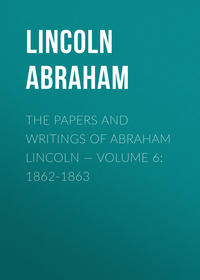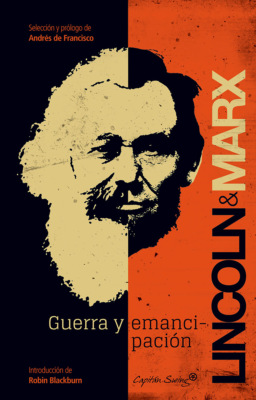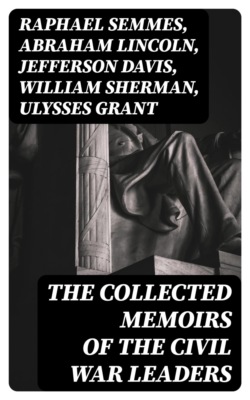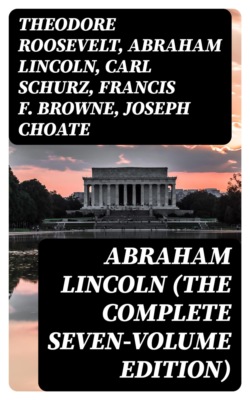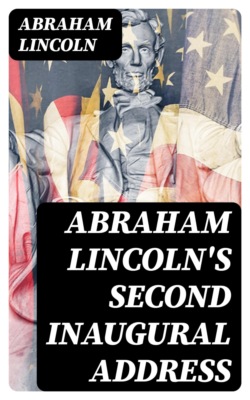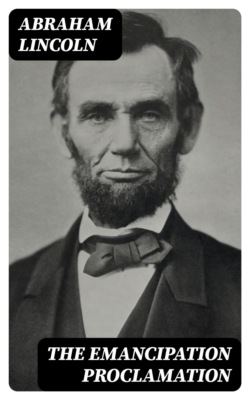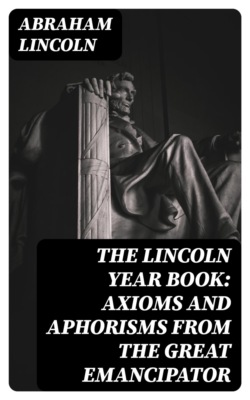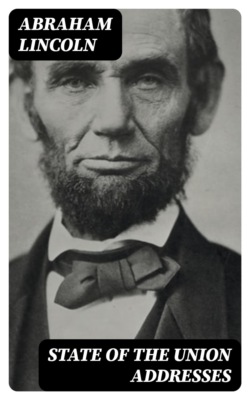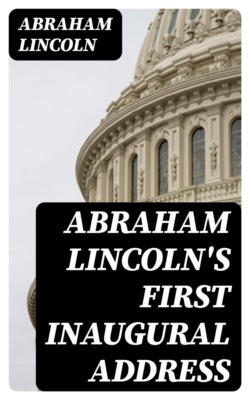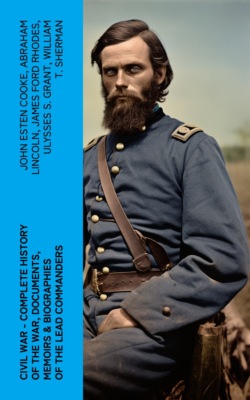Kitabı oku: «The Papers And Writings Of Abraham Lincoln — Volume 6: 1862-1863», sayfa 14
TELEGRAM TO GOVERNOR GAMBLE
WAR DEPARTMENT, December 27, 1862
HIS EXCELLENCY GOVERNOR GAMBLE:
I do not wish to leave the country north of the Missouri to the care of the enrolled militia except upon the concurrent judgment of yourself and General Curtis. His I have not yet obtained. Confer with him, and I shall be glad to act when you and he agree.
A. LINCOLN
TELEGRAM TO GENERAL A. E. BURNSIDE
WAR DEPARTMENT, WASHINGTON CITY, D.C., December 30, 1862. 3.30 PM
MAJOR-GENERAL BURNSIDE:
I have good reason for saying you must not make a general movement of the army without letting me know.
A. LINCOLN.
TELEGRAM TO GENERAL DIX
EXECUTIVE MANSION, WASHINGTON, December 31, 1862
MAJOR-GENERAL Dix, Fort Monroe, Va.:
I hear not a word about the Congressional election of which you and I corresponded. Time clearly up.
A. LINCOLN.
TELEGRAM TO H. J. RAYMOND
(Private.)
EXECUTIVE MANSION, WASHINGTON, December 31, 1862.
HON. H. J. RAYMOND:
The proclamation cannot be telegraphed to you until during the day to-morrow.
JNO. G. NICOLAY.
[Same to Horace Greeley]
1863
EMANCIPATION PROCLAMATION, JANUARY 1, 1863
THE PRESIDENT OF THE UNITED STATES OF AMERICA:
A Proclamation.
Whereas on the 22d day of September, A.D. 1862, a proclamation was issued by the President of the United States, containing, among other things, the following, to wit:
"That on the 1st day of January, A.D., 1863, all persons held as slaves within any State or designated part of a State the people whereof shall then be in rebellion against the United States shall be then, thenceforward, and forever free; and the executive government of the United States, including the military and naval authority thereof, will recognize and maintain the freedom of such persons and will do no act or acts to repress such persons, or any of them, in any efforts they may make for their actual freedom.
"That the executive will on the 1st day of January aforesaid, by proclamation, designate the States and parts of States, if any, in which the people thereof, respectively, shall then be in rebellion against the United States; and the fact that any State or the people thereof shall on that day be in good faith represented in the Congress of the United States by members chosen thereto at elections wherein a majority of the qualified voters of such States shall have participated shall, in the absence of strong countervailing testimony, be deemed conclusive evidence that such State and the people thereof are not then in rebellion against the United States."
Now, therefore, I, Abraham Lincoln, President of the United States, by virtue of the power in me vested as Commander-in-Chief of the Army and Navy of the United States in time of actual armed rebellion against the authority and government of the United States, and as a fit and necessary war measure for suppressing said rebellion, do, on this 1st day of January, A. D. 1863, and in accordance with my purpose so to do, publicly proclaimed for the full period of one hundred days from the first day above mentioned, order and designate as the States and parts of States wherein the people thereof, respectively, are this day in rebellion against the United States the following, to wit:
Arkansas, Texas, Louisiana (except the parishes of St. Bernard, Plaquemines, Jefferson, St. John, St. Charles, St. James, Ascension, Assumption, Terre Bonne, Lafourche, St. Mary, St. Martin, and Orleans, including the city of New Orleans), Mississippi, Alabama, Florida, Georgia, South Carolina, North Carolina, and Virginia (except the forty-eight counties designated as West Virginia, and also the counties of Berkeley, Accomac, Northampton, Elizabeth City, York, Princess Anne, and Norfolk, including the cities of Norfolk and Portsmouth), and which excepted parts are for the present left precisely as if this proclamation were not issued.
And by virtue of the power and for the purpose aforesaid, I do order and declare that all persons held as slaves within said designated States and parts of States are, and henceforward shall be, free; and that the Executive Government of the United States, including the military and naval authorities thereof, will recognize and maintain the freedom of said persons.
And I hereby enjoin upon the people so declared to be free to abstain from all violence, unless in necessary self-defense; and I recommend to them that, in all cases when allowed, they labor faithfully for reasonable wages.
And I further declare and make known that such persons of suitable condition will be received into the armed service of the United States to garrison forts, positions, stations, and other places, and to man vessels of all sorts in said service.
And upon this act, sincerely believed to be an act of justice, warranted by the Constitution upon military necessity, I invoke the considerate judgment of mankind and the gracious favor of Almighty God.
In witness whereof I have hereunto set my hand and caused the seal of the United States to be affixed.
Done at the city of Washington, this first day of January, A.D. 1863, and of the independence of the United States of America the eighty-seventh.
A. LINCOLN.
By the President: WILLIAM H. SEWARD, Secretary of State.
TO GENERAL H. W. HALLECK
EXECUTIVE MANSION, WASHINGTON January 1, 1863
MAJOR-GENERAL HALLECK.
DEAR SIR: — General Burnside wishes to cross the Rappahannock with his army, but his grand division commanders all oppose the movement. If in such a difficulty as this you do not help, you fail me precisely in the point for which I sought your assistance You know what General Burnside's plan is, and it is my wish that you go with him to the ground, examine it as far as practicable, confer with the officers, getting their judgment, and ascertaining their temper — in a word, gather all the elements for forming a judgment of your own, and then tell General Burnside that you do approve or that you do not approve his plan. Your military skill is useless to me if you will not do this.
Yours very truly,
A. LINCOLN
[Indorsement]
January 1, 1863 Withdrawn, because considered harsh by General Halleck.
A. LINCOLN.
MESSAGE TO CONGRESS
WASHINGTON, January 2, 1863
TO THE SENATE AND HOUSE OF REPRESENTATIVES:
I submit to Congress the expediency of extending to other departments of the government the authority conferred on the President by the eighth section of the act of the 8th of May, 1792, to appoint a person to temporarily discharge the duties of Secretary of State, Secretary of the Treasury, and Secretary of War, in case of the death, absence from the seat of government, or sickness of either of those officers.
A. LINCOLN.
TO GENERAL S. R. CURTIS
EXECUTIVE MANSION, WASHINGTON JANUARY 2, 1863
MAJOR-GENERAL CURTIS.
MY DEAR SIR: — Yours of December 29 by the hand of Mr. Strong is just received. The day I telegraphed you suspending the order in relation to Dr. McPheeters, he, with Mr. Bates, the Attorney-General, appeared before me and left with me a copy of the order mentioned. The doctor also showed me the Copy of an oath which he said he had taken, which is indeed very strong and specific. He also verbally assured me that he had constantly prayed in church for the President and government, as he had always done before the present war. In looking over the recitals in your order, I do not see that this matter of the prayer, as he states it, is negatived, nor that any violation of his oath is charged nor, in fact, that anything specific is alleged against him. The charges are all general: that he has a rebel wife and rebel relations, that he sympathies with rebels, and that he exercises rebel influence. Now, after talking with him, I tell you frankly I believe he does sympathize with the rebels, but the question remains whether such a man, of unquestioned good moral character, who has taken such an oath as he has, and cannot even be charged with violating it, and who can be charged with no other specific act or omission, can, with safety to the government, be exiled upon the suspicion of his secret sympathies. But I agree that this must be left to you, who are on the spot; and if, after all, you think the public good requires his removal, my suspension of the order is withdrawn, only with this qualification, that the time during the suspension is not to be counted against him. I have promised him this. But I must add that the United States Government must not, as by this order, undertake to run the churches. When an individual in a church or out of it becomes dangerous to the public interest, he must be checked; but let the churches, as such, take care of themselves. It will not do for the United States to appoint trustees, supervisors, or other agents for the churches.
Yours very truly,
A. LINCOLN.
P. S. — The committee composed of Messrs. Yeatman and Filley (Mr. Broadhead not attending) has presented your letter and the memorial of sundry citizens. On the whole subject embraced exercise your best judgment, with a sole view to the public interest, and I will not interfere without hearing you.
A. LINCOLN., January 3, 1863.
TO SECRETARY WELLES
EXECUTIVE MANSION, WASHINGTON, January 4, 1863
HON. GIDEON WELLES, Secretary of the Navy.
DEAR SIR: — As many persons who come well recommended for loyalty and service to the Union cause, and who are refugees from rebel oppression in the State of Virginia, make application to me for authority and permission to remove their families and property to protection within the Union lines, by means of our armed gunboats on the Potomac River and Chesapeake Bay, you are hereby requested to hear and consider all such applications, and to grant such assistance to this class of persons as in your judgment their merits may render proper, and as may in each case be consistent with the perfect and complete efficiency of the naval service and with military expediency.
A. LINCOLN.
TO GENERAL S. L CURTIS
EXECUTIVE MANSION, WASHINGTON, January 5, 1863
MAJOR-GENERAL CURTIS.
MY DEAR SIR: — I am having a good deal of trouble with Missouri matters, and I now sit down to write you particularly about it. One class of friends believe in greater severity and another in greater leniency in regard to arrests, banishments, and assessments. As usual in such cases, each questions the other's motives. On the one hand, it is insisted that Governor Gamble's unionism, at most, is not better than a secondary spring of action; that hunkerism and a wish for political influence stand before Unionism with him. On the other hand, it is urged that arrests, banishments, and assessments are made more for private malice, revenge, and pecuniary interest than for the public good. This morning I was told, by a gentleman who I have no doubt believes what he says, that in one case of assessments for $10,000 the different persons who paid compared receipts, and found they had paid $30,000. If this be true, the inference is that the collecting agents pocketed the odd $20,000. And true or not in the instance, nothing but the sternest necessity can justify the making and maintaining of a system so liable to such abuses. Doubtless the necessity for the making of the system in Missouri did exist, and whether it continues for the maintenance of it is now a practical and very important question. Some days ago Governor Gamble telegraphed me, asking that the assessments outside of St. Louis County might be suspended, as they already have been within it, and this morning all the members of Congress here from Missouri but one laid a paper before me asking the same thing. Now, my belief is that Governor Gamble is an honest and true man, not less so than yourself; that you and he could confer together on this and other Missouri questions with great advantage to the public; that each knows something which the other does not; and that acting together you could about double your stock of pertinent information. May I not hope that you and he will attempt this? I could at once safely do (or you could safely do without me) whatever you and he agree upon. There is absolutely no reason why you should not agree.
Yours as ever,
A. LINCOLN.
P. S. — I forgot to say that Hon. James S. Rollins, member of Congress from one of the Missouri districts, wishes that, upon his personal responsibility, Rev. John M. Robinson, of Columbia, Missouri; James L. Matthews, of Boone County, Missouri; and James L. Stephens, also of Boone County, Missouri, may be allowed to return to their respective homes. Major Rollins leaves with me very strong papers from the neighbors of these men, whom he says he knows to be true men. He also says he has many constituents who he thinks are rightly exiled, but that he thinks these three should be allowed to return. Please look into the case, and oblige Major Rollins if you consistently can.
Yours truly,
A. LINCOLN.
[Copy sent to Governor Gamble.]
TO CALEB RUSSELL AND SALLIE A. FENTON
EXECUTIVE MANSION, WASHINGTON, January 5, 1863
MY GOOD FRIENDS: The Honorable Senator Harlan has just placed in my hands your letter of the 27th of December, which I have read with pleasure and gratitude.
It is most cheering and encouraging for me to know that in the efforts which I have made and am making for the restoration of a righteous peace to our country, I am upheld and sustained by the good wishes and prayers of God's people. No one is more deeply than myself aware that without His favor our highest wisdom is but as foolishness and that our most strenuous efforts would avail nothing in the shadow of His displeasure.
I am conscious of no desire for my country's welfare that is not in consonance with His will, and of no plan upon which we may not ask His blessing. It seems to me that if there be one subject upon which all good men may unitedly agree, it is imploring the gracious favor of the God of Nations upon the struggles our people are making for the preservation of their precious birthright of civil and religious liberty.
Very truly your friend;
A. LINCOLN.
TELEGRAM TO GENERAL ROSECRANS
EXECUTIVE MANSION, WASHINGTON, January 5. 1863
MAJOR-GENERAL W. S. ROSECRANS, Murfreesborough, Tenn.: Your despatch announcing retreat of enemy has just reached here. God bless you and all with you! Please tender to all, and accept for yourself, the nation's gratitude for your and their skill, endurance, and dauntless courage.
A. LINCOLN.
TELEGRAM TO GENERAL DIX
WAR DEPARTMENT, WASHINGTON, D.C., January 7, 1863
MAJOR-GENERAL DIX, Fort Monroe, Va.:
Do Richmond papers of 6th say nothing about Vicksburg, or if anything, what?
A. LINCOLN.
TO GENERAL H. W. HALLECK
EXECUTIVE MANSION, WASHINGTON January 7, 1863
MAJOR-GENERAL HALLECK.
MY DEAR SIR: — What think you of forming a reserve cavalry corps of, say, 6000 for the Army of the Potomac? Might not such a corps be constituted from the cavalry of Sigel's and Slocum's corps, with scraps we could pick up here and there?
Yours truly,
A. LINCOLN.
TELEGRAM TO B. G. BROWN
WASHINGTON, D. C., January 7, 1863. 5.30 P.M
HON. B. GRATZ BROWN, Jefferson City, Mo.:
Yours of to-day just received. The administration takes no part between its friends in Missouri, of whom I, at least, consider you one; and I have never before had an intimation that appointees there were interfering, or were inclined to interfere.
A. LINCOLN.
CORRESPONDENCE WITH GENERAL A. E. BURNSIDE, JANUARY 8, 1863
HEADQUARTERS ARMY OF THE POTOMAC January 5, 1863.
HIS EXCELLENCY THE PRESIDENT OF THE UNITED STATES:
Since my return to the army I have become more than ever convinced that the general officers of this command are almost unanimously opposed to another crossing of the river; but I am still of the opinion that the crossing should be attempted, and I have accordingly issued orders to the engineers and artillery to prepare for it. There is much hazard in it, as there always is in the majority of military movements, and I cannot begin the movement without giving you notice of it, particularly as I know so little of the effect that it may have upon other movements of distant armies.
The influence of your telegram the other day is still upon me, and has impressed me with the idea that there are many parts of the problem which influence you that are not known to me.
In order to relieve you from all embarrassment in my case, I inclose with this my resignation of my commission as major-general of volunteers, which you can have accepted if my movement is not in accordance with the views of yourself and your military advisers.
I have taken the liberty to write to you personally upon this subject, because it was necessary, as I learned from General Halleck, for you to approve of my general plan, written at Warrenton, before I could commence the movement; and I think it quite as necessary that you should know of the important movement I am about to make, particularly as it will have to be made in opposition to the views of nearly all my general officers, and after the receipt of a despatch from you informing me of the opinion of some of them who had visited you.
In conversation with you on New Year's morning I was led to express some opinions which I afterward felt it my duty to place on paper, and to express them verbally to the gentleman of whom we were speaking, which I did in your presence, after handing you the letter. You were not disposed then, as I saw, to retain the letter, and I took it back, but I now return it to you for record if you wish it.
I beg leave to say that my resignation is not sent in in any spirit of insubordination, but, as I before said, simply to relieve you from any embarrassment in changing commanders where lack of confidence may have rendered it necessary.
The bearer of this will bring me any answer, or I should be glad to hear from you by telegraph in cipher.
I have the honor to be, very respectfully, your obedient servant,
A. E. BURNSIDE,
Major-General, Commanding Army of the Potomac.
HEADQUARTERS OF THE ARMY, WASHINGTON, January 7, 1863
MAJOR-GENERAL BURNSIDE, Commanding, etc., Falmouth:
GENERAL: — Your communication of the 5th was delivered to me by your aide-de-camp at 12 M. to-day.
In all my communications and interviews with you since you took command of the Army of the Potomac I have advised a forward movement across the Rappahannock. At our interview at Warrenton I urged that you should cross by the fords above Fredericksburg rather than to fall down to that place; and when I left you at Warrenton it was understood that at least a considerable part of your army would cross by the fords, and I so represented to the President. It was this modification of the plan proposed by you that I telegraphed you had received his approval. When the attempt at Fredericksburg was abandoned, I advised you to renew the attempt at some other point, either in whole or in part, to turn the enemy's works, or to threaten their wings or communications; in other words, to keep the enemy occupied till a favorable opportunity offered to strike a decisive blow. I particularly advised you to use your cavalry and light artillery upon his communications, and attempt to cut off his supplies and engage him at an advantage.
In all our interviews I have urged that our first object was, not Richmond, but the defeat or scattering of Lee's army, which threatened Washington and the line of the upper Potomac. I now recur to these things simply to remind you of the general views which I have expressed, and which I still hold.
The circumstances of the case, however, have somewhat changed since the early part of November. The chances of an extended line of operations are now, on account of the advanced season, much less than then. But the chances are still in our favor to meet and defeat the enemy on the Rappahannock, if we can effect a crossing in a position where we can meet the enemy on favorable or even equal terms. I therefore still advise a movement against him. The character of that movement, however, must depend upon circumstances which may change any day and almost any hour. If the enemy should concentrate his forces at the place you have selected for a crossing, make it a feint and try another place. Again, the circumstances at the time may be such as to render an attempt to cross the entire army not advisable. In that case, theory suggests that, while the enemy concentrates at that point, advantages can be gained by crossing smaller forces at other points to cut off his lines, destroy his communication, and capture his rear-guards, outposts, etc. The great object is to occupy the enemy to prevent his making large detachments or distant raids, and to injure him all you can with the least injury to yourself. If this can be best accomplished by feints of a general crossing and detached real crossings, take that course; if by an actual general crossing, with feints on other points, adopt that course. There seem to me to be many reasons why a crossing at some point should be attempted. It will not do to keep your large army inactive. As you yourself admit, it devolves on you to decide upon the time, place, and character of the crossing which you may attempt. I can only advise that an attempt be made, and as early as possible.
Very respectfully, your obedient servant,
H. W. HALLECK, General-in-Chief.
[Indorsement.]
January 8, 1863.
GENERAL BURNSIDE:
I understand General Halleck has sent you a letter of which this is a copy. I approve this letter. I deplore the want of concurrence with you in opinion by your general officers, but I do not see the remedy. Be cautious, and do not understand that the government or country is driving you. I do not yet see how I could profit by changing the command of the Army of the Potomac; and if I did, I should not wish to do it by accepting the resignation of your commission.
A. LINCOLN.
